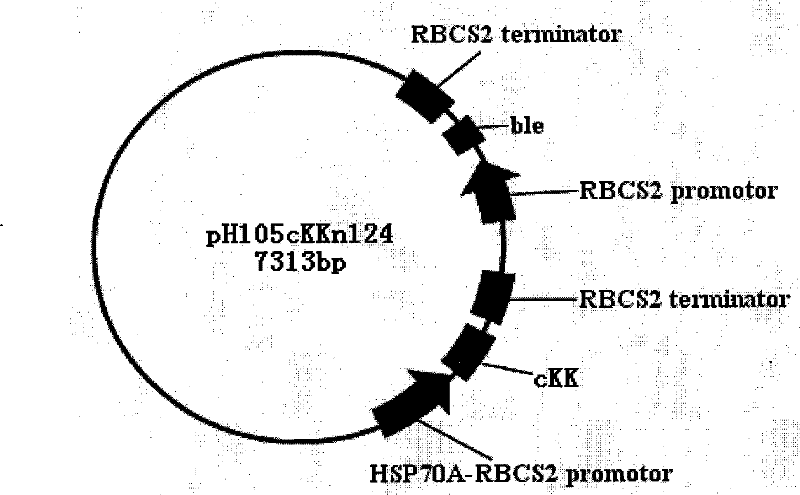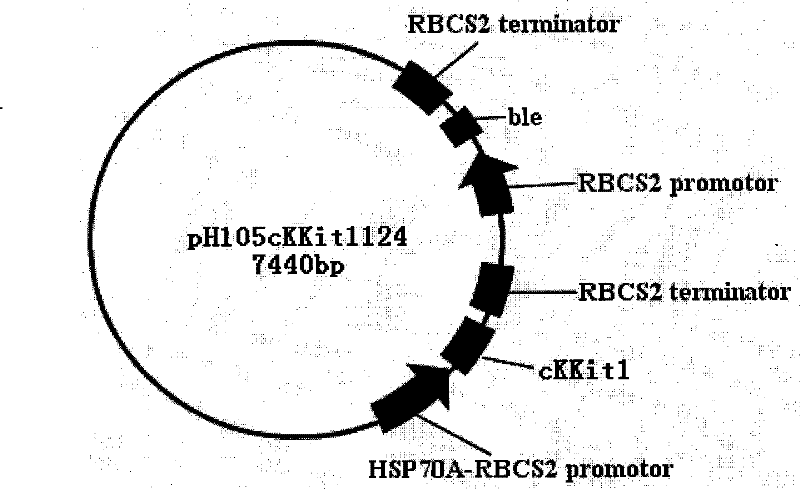Construction method of transgenic chlamydomonas reinhardtii for expressing human tissue kallikrein
A technology of kallikrein and construction method, which is applied in the field of construction of transgenic Chlamydomonas reinhardtii, can solve the problems of lack of glycosylation modification, high culture cost, and inability to carry out stable genetics, etc. Rich and broad application prospects
- Summary
- Abstract
- Description
- Claims
- Application Information
AI Technical Summary
Problems solved by technology
Method used
Image
Examples
Embodiment 1
[0046] Example 1: Selection and cultivation of transgenic recipient algal strains
[0047] Cell wall-defective Chlamydomonas reinhardtii (Chlamydomonas reinhardtii, cc-849, purchased from the Chlamydomonas Genetic Center of Duck University, USA) and cytochrome b-deficient Chlamydomonas reinhardtii (cc-2654, purchased from the Chlamydomonas Genetic Center of Duck University, USA) were selected as Transgenic recipient strains. Use TAP medium as the medium for Chlamydomonas reinhardtii, its formula and composition are as follows: 2.42g Tris, 25mL 4 × Beijerinck salts (16g NH 4 Cl, 2gCaCl 2 .2H 2 O, 4g MgSO 4 .7H 2 Dissolve O in water, dilute to 1L), 1mL 1M(K)PO 4 , 1mL Trace trace element mixture (11.4g H 3 BO 3 , 5.6g MnCl 2 .4H 2 O,22gZnSO 4 .7H 2 O, 4.99 g FeSO 4 .7H 2 O, 1.61g CoCl 2 .6H 2 O, 1.57g CuSO 4 .5H 2 O, 1.1g (NH 4 ) 6 Mo 7 o 24 .4H 2 O, 50g Na 2 EDTA, dissolved in water, adjusted to pH 6.5-6.8 with 20% KOH, dilute to 11), dissolved in 975mL w...
Embodiment 2
[0049] Example 2: Transformation of Chinese Tissue Kallikrein Gene
[0050] According to the known Chinese tissue kallikrein gene (GenBank accession number: AY703451) and the preferred codon table of Chlamydomonas reinhardtii (http: / / www.chlamy.org / ), respectively design and artificial synthesis suitable for Chlamydomonas reinhardtii The cKKn gene for nuclear expression, the cKKch1 gene for Chlamydomonas reinhardtii chloroplast expression and the cKKmt gene for Chlamydomonas reinhardtii mitochondrial expression. At the same time, RBCS2 intron 1 (GneBank accession number: X04472) was inserted into the cKKn gene replaced by preferential codons, and the cKKit1 gene containing RBCS2 intron 1 was synthesized by artificial synthesis. The cKKn gene sequence is shown in SEQ ID NO.1, the cKKit1 gene sequence is shown in SEQ ID NO.2, the cKKch1 gene sequence is shown in SEQ ID NO.3, and the cKKmt gene sequence is shown in SEQ ID NO.4.
[0051] The genes cKKn, cKKit1, cKKch1 and cKKmt w...
Embodiment 3
[0052] Example 3: Construction of hK1 expression gene Chlamydomonas expression vector
[0053] (1) Construction of hk1 expression gene Chlamydomonas reinhardtii nuclear expression vector
[0054] Plasmid pckkn18 contains cKKn gene, which can be obtained by Nhe I and Pmac I double digestion. Plasmid pckkit118 contains cKKit1 gene, which can be obtained by NheI and PmacI double digestion. The vector pH105 (Wu JX et al. Efficient expression of green fluorescent protein (GFP) mediated by a chimeric promoter in Chlamydomonas reinhardtii. Chinese Journal of Oceanology and Limnology. Accepted) was cloned with HSP70A-RBCS2 promoter sequence and RBCS2 terminator sequence, the middle Carrying multiple cloning restriction sites such as PmacI, NheI, XbaI and SalI, foreign genes can be inserted and expressed in the nuclear genome of Chlamydomonas reinhardtii. Vector pSP124 (Lambreras v, StevensDR, Purton S. Efficient foreign gene expression in Chlamydomonas reinhardtii mediated by an end...
PUM
 Login to View More
Login to View More Abstract
Description
Claims
Application Information
 Login to View More
Login to View More - R&D
- Intellectual Property
- Life Sciences
- Materials
- Tech Scout
- Unparalleled Data Quality
- Higher Quality Content
- 60% Fewer Hallucinations
Browse by: Latest US Patents, China's latest patents, Technical Efficacy Thesaurus, Application Domain, Technology Topic, Popular Technical Reports.
© 2025 PatSnap. All rights reserved.Legal|Privacy policy|Modern Slavery Act Transparency Statement|Sitemap|About US| Contact US: help@patsnap.com



